#general:resources
Explore tagged Tumblr posts
Text
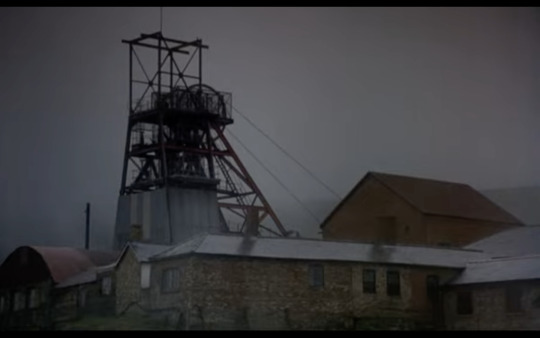

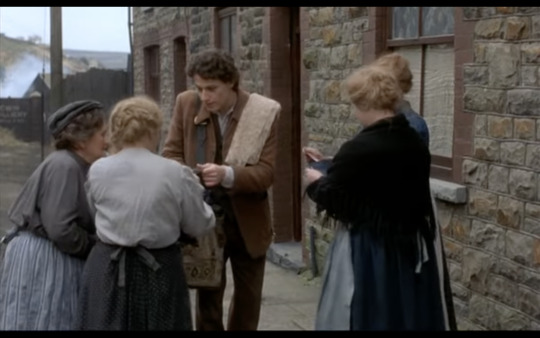


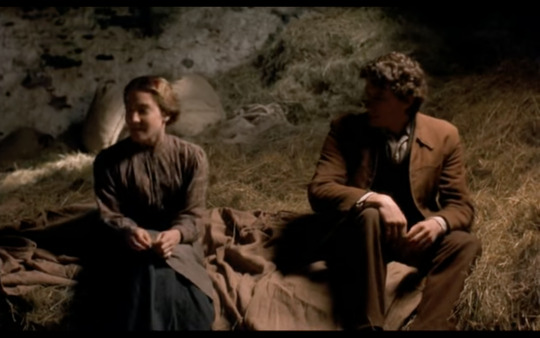


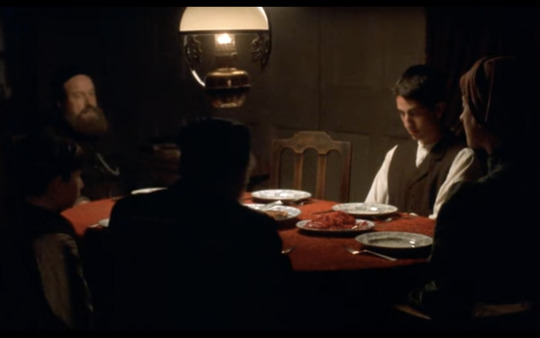

Solomon a Gaenor (1999)
1h40m | Welsh, Yiddish, & English
Y wythnos diwetha', nes i weld y ffilm 'ma. Mae hi'n am Solomon Levinsky, sy'n dod i'r Cymoedd De Cymru o Rwsia efo'i deulu, a Gaenor Rees, sy wedi byw yna ei holl fywyd. Mae Solomon a'i deulu'n Iddewon Uniongred, a mae Gaenor yn dod o deulu Anghydffurfiol, ond mae'r dau'n disgyn mewn cariad. Mae'r stori'n dipyn bach fel Romeo a Juliet, ond mae hi'n wahanol hefyd—mae'r cymeriadau'n mwy cymhleth, yn fy marn i, ac yn y diwedd o'n i ddim yn siwr beth i feddwl amdanyn nhw. Er hynny, mae'r hanes yn ddiddorol iawn, a mae'r ffilm yn sôn am y streiciau yn y Cymoedd ac am hanes Iddewig yng Nghmyru. Mae'r sinematograffi'n wych, ac o'n i'n licio'r trac sain hefyd, ond dwi'n dal i drio penderfynu am y plot. Rhaid i chi'w gweld a deud beth ydach chi'n meddwl!
Last week, I watched this film. It's about Solomon Levinsky, who comes to the South Wales Valleys from Russia with his family, and Gaenor Rees, who's lived there all her life. Solomon and his family are Orthodox Jews, and Gaenor is from a Noncomformist family, but the two fall in love. The story is a bit like Romeo and Juliet, but it's different too—the characters are more complex, in my opinion, and at the end I wasn't sure what to think about them. The history was really interesting, though, and the film talks about the strikes in the Valleys and about Jewish history in Wales. The cinematography is great, and I liked the soundtrack as well, but I'm still trying to decide about the plot. You have to watch it and tell me what you think!
Geirfa - Vocabulary
(Note: The movie is set in South Wales, so some of these are Southern Welsh variants)
swllt - shilling cefn gwlad - countryside cenhadwr - missionary perthyn i - belong to, be related to pai' bod yn ddwl - don’t be silly rhywpryd eto - another time tost - sick moddion - medicine damwain - accident twymo - to heat up darn - passage tlawd - poor cwlwm - knot siort - type pobi - to back carthu - to clean bod mas o gyrraedd - out of reach of, past main - fine cyhuddiad - charge, accusation dieithryn - outsider cosb - punishment disgwyl babi/plentyn - to be expecting a child, to be with child cywilydd - shame bradychu - to betray gwlân - wool sodli - heel gweddi - prayer rheol - rule haearn - iron lliain - towel pyped - puppet dere ymlaen - come on, let’s go carchar - prison cyfeiriad - address gwau - to knit
Os ti isio gweld y ffilm, mae hi ar Youtube // If you want to watch the movie, it's on Youtube:
Fersiwn Gymraeg (heb isdeitlau/isdeitlau i'r Iddew-Almaeneg yn Gymraeg) / Version in Welsh (no subtitles/subtitles for the Yiddish in Welsh)
Fersiwn Saesneg (y rhan amla' yn Saesneg efo rhannau yn Gymraeg a Iddew-Almaeneg/isdeitlau i'r holl ffilm) / Version in English (mostly English with parts in Welsh and Yiddish/subtitles for the whole film)
#i am *really* still not sure what to think about this movie but i was very pretty and it left me with lots to think about#mae'n ddrwg gen i dwi ddim yn siarad cymraeg ond dwi'n trio :'))) dwi isio gwella y flwyddyn 'ma#the welsh version and the english version were different takes so it's not dubbed which means if you watch both you get slight differences#it's also impossible to find the welsh version hence why i'm sharing it here#anyways interesting movie i'm still trying to decided how i feel about it#welsh:general#welsh:culture#welsh:vocab#welsh:practice#welsh:resources#welsh:reference#general:culture#general:vocab#general:practice#general:resources#general:reference
5 notes
·
View notes
Link
I’m probably very late finding this out, but Briz’s Cansons de la terra is on Wikitexts, with sheet music and MIDI recordings, so if you want to go wild looking through 19th century Catalan folksongs you can now do that!
#also a lot of his other works as well <3#viquitexts truly comes through the devil works hard but catalans on wikipedia work harder#i found the original book in my school's library and was hoping to find an online version but i literally just stumbled on this out of nowhe#nowhere*#catalan:general#catalan:music#catalan:resources#general:music#general:resources
5 notes
·
View notes
Note
Hello, do you know of any good resources for learning Welsh? I know about SSiW and Duolingo and have used them in the past, but I was wondering if you knew about any more good ones. Thank you so much, and Happy New Years to you!!
Okay, I will say that SSiW is by far my top recommendation, at least for getting started. Yes it's annoying to have to do those drills, no it's probably not perfect, but it does exactly what's on the label: teaches you to be able to say things in Welsh. That being said, it shouldn't be the only thing you use, and if you can't handle it then I totally understand. Here are some other resources I quite like:
Language Resources:
The Welsh government has a website for Welsh learners, it might take some digging but there's a lot of things there, even if you're not located in Wales
BBC Wales' Welsh at Home is deprecated but is still available in an archive version, and has lots of vocab and grammar (plus it's divided North/South, which is always good)
Clwb Malu Cachu is also very old but has lots and lots of good stuff
You can look at the BBC's WJEC Welsh as a Second Language review page if you need more materials to study from, although this isn't really a good way to learn the language
Reference Resources:
Geiriadur Bangor is the best online dictionary, it's very helpful and can unconjugate verbs and unmutate words to figure out what the dictionary root is if you're stuck. Also, if you look at the bottom left of the homepage there's a list of links to other dictionaries and resources, in case you want them.
Modern Welsh: A Comprehensive Grammar & Modern Welsh Dictionary by Gareth King are both excellent resources if you can get your hands on them (by any means necessary, I Do Not See). The dictionary is the cheaper of the two and I would highly recommend it because it has phrases in it as well, which is pretty much the only thing it has that the Geiriadur Bangor doesn't.
Listening/Reading Practice:
It has gone by many names but I think S4C Dysgu Cymraeg is the current one, you can also look at Hwb and there's a couple more in between as well, but this is basically Welsh television's learners program, and has media in Welsh that's been designed for learners.
Pigion: Highlights for Welsh Learners is a podcast with a similar purpose, it takes clips from Radio Cymru for learners and they also have vocab and little summaries for each clip on their website. This one is really a good way to get in your listening practice.
If you live in Wales (or the UK in general??) you can watch S4C. If you don't you can't, which is where I am suffering rn ahaha.
You can read the news on Golwg360 or BBC Cymru, Welsh followers let me know if you have other recommendations.
You can listen to BBC Radio Cymru live online, and you can also browse their listing of podcasts (fingers crossed that's the right link).
Hansh makes a ton of pop-culture-y internet content for teens/young adults, if you want something not too serious to watch.
General Websites:
Readlang actually has very good Welsh support, if you're serious and can afford it then getting pro might be worth it, but the free version also works perfectly well! You can also add it as a browser extension which is very useful for reading news sites.
Memrise courses: I like the 150 Welsh Verbs, 150 Welsh Adjectives, and All Around Confidence for a longer course if you'd like
I will say that Duolingo is one of my least favorite Welsh resources, if it's what you like then go for it but I'd recommend SSiW much more.
Aaaaaaand I think that's going to be it for now, if anyone wants me to add things just let me know but I hope this is a good starting point for you anon :)
#yes i have been hoarding welsh resources since 8th grade how did you know#i think i have more i just don't remember what they are#but tbh the best thing you can do is just immerse yourself as much as you can#even if that's listening to music all the time or talking to your cat or whatever#all of these require lots of effort on your part unlike ssiw or duolingo so keep that in mind#but if you use them right you'll pick up the language a lot quicker#welsh:resources#welsh:general#welsh:reference#general:resources#asks
47 notes
·
View notes
Text
LGBT Terminology/Dictionaries in Minoritized Languages
I was asked by @portugue for some dictionaries/terminology lists in different languages, but I realized when I checked that I actually only have them for 2 of the languages I study. If people have more minoritized language resources for LGBTQIA+ terminology, please add them on here! Let’s try to get as many as we can.
TERMCAT - Diccionari LGBT (Catalan): https://www.termcat.cat/ca/diccionaris-en-linia/256
Stonewall Cymru - Geirfa (Welsh): https://www.stonewallcymru.org.uk/cy/cymorth-chyngor/geirfa -UPDATE: This Google doc has corrections/improvements on the Stonewall Cymru list: https://docs.google.com/document/d/1bE8oVmZEhl6Wxqk6EEiEkv8z5xxq-cyQYjjigQPYKO0/edit
An Foclóir Aiteach (Irish): https://usi.ie/focloir-aiteach/
Celtic Students Blog - LGBTQ Terminology in the Celtic Languages (Welsh, Cornish, Scottish Gaelic, Irish, Manx, Breton): https://celticstudents.blogspot.com/2021/02/lgbtq-terminology-in-celtic-languages.html?m=1
Geidh.uk - Briathrachas LGDTCE+ (Scottish Gaelic): https://geidh.uk/briathrachas-lcdt/
(Last edited: 6/8/21)
#i wish there were more on here :///#i couldn't find them for basque even which was disappointing#i know there's one for irish but i'll let someone else who has the link add that on#catalan#welsh#irish#minoritized languages#lgbtq+#catalan:general#catalan:resources#welsh:general#welsh:resources#general:resources
47 notes
·
View notes
Text
Language Platforms and Resources for Lesser-Studied Languages
I see a lot of posts going around on here about great new resources that people have found for their target languages, but most of the time when I look at them, they don't have any of the languages that I'm learning. For people learning lesser-studied languages (which includes languages that have lots of speakers, like Hausa or Telugu for example, but aren't commonly taught in places where they aren't spoken by most of the population) finding resources can be a headache. While the best route is definitely to try to find classes or native speakers to help, that can be expensive, inaccessible, and sometimes anxiety-inducing. Language platforms are a great resource for building a base or learning grammar, and they should be available for a lot more languages than they are. Still, some are better about including a variety of languages than others, and so I decided to do the work and present you all with a (not-at-all-comprehensive) guide to what resources are pulling their weight in language diversity. Here are the areas that I scored them on:
Asian Languages (not including the Big Three of Mandarin Chinese, Japanese, and Korean, because these are already pretty well represented)
African Languages
Oceanian Languages
American Languages (indigenous to the Americas)
Minoritized & Endangered Languages
Usability
Grammar
Vocabulary
Interactivity
Depth
Overall
** DISCLAIMER: I didn't check all the course for every single language on these websites, so some languages may have better content than others. However, I did check for all the languages that I'm learning, which should cover most of these areas to some degree.**
DUOLINGO
Asian Languages: ☆☆
African Languages: ☆
Oceanian Languages: ☆
American Languages: ☆☆
Minoritized & Endangered Languages: ☆☆
Usability: ☆☆☆☆
Grammar: ☆☆☆
Vocabulary: ☆☆☆
Interactivity: ☆☆☆☆☆
Depth: ☆☆☆☆
Overall: ☆☆
Duolingo is honestly not one of my favorite language learning platforms, but I know there are people who swear by it so I thought I’d include it here just to give a full review.
The pros of Duolingo are that it’s a very sleek, well-established website/app and that it’s fun. I think some people find it easier than trudging through grammar books, and I can’t blame them. However, as far as lesser-studied languages go, it’s not great. Because of the time it takes to develop a course, there’s a vetting process and also personal volition in the way, and that makes it really hard for lots of languages to get put on it. So while there are some minoritized languages represented, and some diversity, it’s not super great, and there are better places to look.
MEMRISE
Asian Languages: ☆☆☆☆
African Languages: ☆☆☆
Oceanian Languages: ☆☆☆
American Languages: ☆☆☆
Minoritized & Endangered Languages: ☆☆☆☆
Usability: ☆☆☆☆
Grammar: ☆
Vocabulary: ☆☆☆☆☆
Interactivity: ☆☆☆☆
Depth: ☆☆☆
Overall: ☆☆☆☆
I am personally a very big fan of Memrise, but it’s definitely not an all-in-one tool for language learning and has its pros and cons. Because the community can create courses, it has a pretty wide range of offerings – but you also have to take things with a grain of salt because you don’t know whether or not they’re correct. I generally try to pick courses that go along with books or were released by a specific organization promoting the language – something which does limit the number of languages which actually are on the platform. Memrise also has the drawback of only really being a vocabulary resource, and not teaching grammar. In conjunction with other resources, though, I think that it’s one of the strongest language-learning platforms for lesser-studied languages.
TATOEBA
Asian Languages: ☆☆☆☆☆
African Languages: ☆☆☆☆
Oceanian Languages: ☆☆☆
American Languages: ☆☆☆☆
Minoritized & Endangered Languages: ☆☆☆☆☆
Usability: ☆☆
Grammar: ☆
Vocabulary: ☆☆☆☆
Interactivity: ☆
Depth: ☆☆
Overall: ☆☆☆
I just looked into this website for the first time a couple weeks ago after having had it bookmarked for years, and it’s somewhat of a goldmine for lesser-studied languages. It has a massive amount of languages available (100-200 probably), and a lot of them have really good phrases that I otherwise wouldn’t have been able to find – it’s great for Tamasheq, for example. It’s also good practice for testing reading comprehension in your target language. It does have quite a few cons though: it’s not interactive at all, so it’s basically only a source of information, not a site like Duolingo or Memrise. It’s also very hit or miss with languages, some having 100+ phrases while others have only 10. Unfortunately, a lot of these are lesser-studied, but I would check it out to see if it has what you need.
CLOZEMASTER
Asian Languages: ☆☆☆
African Languages: ☆
Oceanian Languages: ☆
American Languages: (none available)
Minoritized & Endangered Languages: ☆☆☆
Usability: ☆☆☆☆
Grammar: ☆
Vocabulary: ☆☆☆☆
Interactivity: ☆☆☆
Depth: ☆☆
Overall: ☆☆☆
While this is somewhat of a sad-looking review, Clozemaster is actually not terrible. It’s basically a putting-vocabulary-in-context game, and it has a fairly good selection of languages, especially widely-spoken but underrepresented Asian languages and European endangered and minoritized languages. It’s not perfect, but if you want something more interactive that’s not just rote-memorization like Memrise, this might be fun. It does run out of sentences really quickly though, which means that it’s not a long-term resource. Sentences and words are also of varying usefulness.
READLANG
Asian Languages: ☆☆☆
African Languages: ☆
Oceanian Languages: ☆
American Languages: (none available)
Minoritized & Endangered Languages: ☆☆☆
Usability: ☆☆☆☆
Grammar: ☆
Vocabulary: ☆☆☆
Interactivity: ☆☆☆
Depth: ☆☆
Overall: ☆☆☆
I think that Readlang is an alright resource, although I’ve had mixed results with it. For a lot of the languages, it’s still in beta, and the translations can be wonky sometimes – it seems a little like it’s using Google Translate, which is sometimes not the best. It is a pretty okay resource if you’re just learning to read in your target language, and good to have in your back pocket. The language selection, however, is like Clozemaster in that it skews towards big but underrepresented Asian languages, and basically all of the minoritized languages are European.
101LANGUAGES
Asian Languages: ☆☆☆☆
African Languages: ☆☆☆
Oceanian Languages: ☆☆
American Languages: ☆☆
Minoritized & Endangered Languages: ☆☆☆
Usability: ☆☆☆
Grammar: ☆
Vocabulary: ☆☆☆
Interactivity: ☆☆
Depth: ☆☆
Overall: ☆☆
This website has lots of resource compilations, and while it is somewhat superficial, it does have a decent amount of stuff, especially for African languages (not a lot represented but what it does have has a decent amount of content). It’s more of a jumping-off point than a full language course, but it does have a fairly decent amount of stuff. I don’t want to oversell it, it’s not great for a lot of languages, but it is something.
YOJIK (FSI/DLI/PEACE CORPS)
Asian Languages: ☆☆☆
African Languages: ☆☆☆☆
Oceanian Languages: ☆☆
American Languages: ☆
Minoritized & Endangered Languages: ☆
Usability: ☆☆
Grammar: ☆☆☆☆
Vocabulary: ☆☆☆☆
Interactivity: ☆
Depth: ☆☆☆☆
Overall: ☆☆☆
If you’re learning an African or Asian language that has lots of speakers but isn’t commonly taught, this is the website for you. Basically it’s just a hoard of old FSI, DLI, and Peace Corps courses, and so any language which might be of interest to US foreign policy or aid is here (okay maybe not every one, but a whole lot of them). That being said, the courses are old (outdated, often) and very dry, so take them with a grain of salt. Either way, it’s a good stash of language materials to have, and is the only website here to actually have solid African representation.
LIVE LINGUA PROJECT
Asian Languages: ☆☆☆
African Languages: ☆☆☆☆
Oceanian Languages: ☆☆
American Languages: ☆
Minoritized & Endangered Languages: ☆
Usability: ☆☆☆
Grammar: ☆☆☆☆
Vocabulary: ☆☆☆☆
Interactivity: ☆
Depth: ☆☆☆☆
Overall: ☆☆☆☆
The Livelingua project is basically the same thing as Yojik, just often the materials are more modern and a little more user-friendly. It does also use FSI/DLI/Peace Corps courses, just as a heads up. This is absolutely the place I would go for African languages, but the selection is more slim for languages from other parts of the world.
CONCLUSION
As learners of lesser-studied languages, getting resources is always going to be difficult. Unfortunately, even some of the best websites are not going to have what you need. My number one recommendation for learners is to get a good course book or grammar, and find someone to practice with. As far as websites go, general websites are honestly never going to be your best bet – look for things made specifically for learners of your language instead. Still, it’s not all terrible, and hopefully some of these websites are at least somewhat helpful for people on here who are struggling. If you know any more, I’d love to hear them, since I’m always on the lookout myself!
#this is......the most detailed thing i will ever do#hope it helps some of you#the honest to god truth is that all of these suck to some degree#but some suck less than others and i figured you should at least know about them#plus i'm tired of just seeing things for major european languages on my dash#so we're changing it up#all reviews are entirely subjective and also the content of these sites may vary in goodness#a lot of them i haven't used at length so they might not be perfect#just a disclaimer#feel free to add your opinions#resources#edit: made it format better#tumblr actually formatting so i don't have to go into the html to edit it myself challenge >:'0#general:resources#general:reference
102 notes
·
View notes
Text
Vocab List Maker
Hello everyone! I have a thing that I have created that I think is now ready to be shared and it is *drumroll*.......a vocablist maker!
It’s on my desktop blog or at this link, and it is still very much in beta so if it doesn’t work please send me an ask or a message and I’ll try to figure out what the problem is.
Basically, what this lets you enter in your vocab, click a couple of checkboxes for the formatting you want, and it’ll format all the lines for you so you can have a nice list to post on here. In addition, it takes in vocab from a spreadsheet in a format which can also be used to mass-add vocab items on Quizlet and Memrise (and probably most similar apps), which means that you can easily have a set of flashcards to study from. How do you do all of this? Let me show you!
Step 1: Type up your vocab!
This is the most intensive step, and yes, you do actually have to type up and look up your vocab words, but it’s in a spreadsheet, which is kind of easier than on a document?? idk I don’t really have a selling point for this
Here’s an example with 2 columns:

Here’s an example with many columns:

Step 2: Copy into vocab list maker
So now that we’ve got all of our words typed up, we can have some fun! I’m going to go through all the sections of the list maker just to clarify what they mean:
Select the section of your table with your words in it and copy it all into the box labeled “Vocab Items” towards the bottom of the page. Then make sure to enter the number of columns in the box under “Number of Columns” if it’s something besides 2. After that, you can feel free to mess around with the various checkboxes until you get a result you like.
The color boxes take a 6-character hex code. If you look up “color picker” or something in your browser it should give you something so you can choose a color that you like. Then look for the sequence of 6 characters (a combination numbers 0-9 and letters a-f), often with a # in front of it, and copy that in.
The header part lets you put something in front of a line to signal that it’s a header. You can make it be it’s own thing, like this (typing in ##Primary Colors):
Primary Colors
or you can make it match the vocab in the list, like this (typing in ##el color(tab)color):
el color - color
There’s a preview in the right panel so you can get an idea of what things look like better there (and it updates as you go).
Step 3: Copy your code into a Tumblr post
If you know how to do HTML stuff in Tumblr, you can skip this section, the tl;dr is that you copy the stuff under “HTML Code” into an HTML Tumblr post and that’s basically it.
If you don’t know how to do HTML stuff in Tumblr, don’t worry! This step is really simple actually.
First of all, click on the post type that you want to make (this works with images/audio/video/etc as well). Then, especially if you are using color, make sure to add any images/GIFs/commentary that you want into your post first. This is super important because with color, you can’t leave HTML mode afterwards to change anything, and you can’t upload images to your post in HTML mode.
Once that’s done, click the little gear at the very top right-hand side of your post. Change Text editor from “Rich text” to “HTML,” and copy in the code from the HTML code box on the vocab list maker. You can click on “Preview” if you want to check over your post one last time, but besides that you’re good to go!
Bonus: Make flashcards!
Now that you have all of your words typed up in a spreadsheet, you can do some more nifty things with them: you can mass import them into your favorite study app to make flashcards. I’ve only used Memrise and Quizlet, but I believe Anki also has this feature. For Quizlet, when creating a list, click on “+ Import from Word, Excel, Google Docs, etc.” (right under the description) and copy your spreadsheet into the box. For Memrise, click on “Advanced” (to the right near the top) and select “Bulk add words”, then copy in from your spreadsheet.
Disclaimer
I’m not a professional developer, I just made this for fun. Especially since this is in beta, please be patient. I’d really appreciate any suggestions for features that you want or that would make this more accessible, so feel free to send me those too, and ask for clarification if you need it. Besides that, enjoy!
#langblr#i wrote this in like a day#idk what i was on that day but i'm a little afraid of past me#anyway lmk if it breaks#might be updating it throughout the week#the best part of this is that it deals with color which is a pain on regular tumblr#i hope this encourages more people to make oc! also to study your languages since it's easier to make flashcards :)#please feel free to reblog this around to spread the word!#resources#all images are id'd in alt text#general:resources#general:reference
10 notes
·
View notes
Text
Kimbundu Resources
Hi @unicorns-eat-pizza, I was your @langblrsecretsanta for this year! I saw that you were interested in learning Kimbundu but that you also felt like you didn’t have enough time to study it, so I thought I’d give you a list of low-effort and easy to access resources to get you started (hopefully you haven’t used all of these already). Best of luck with your studies, Kimbundu seems like a really interesting language!
(also I saw in your bio that you speak Portuguese, so I’m hoping it’s okay that some of these are only in Portuguese)
Music
A playlist of music in Kimbundu (Spotify)
A Youtube playlist which has a lot of songs in Kimbundu subtitled with a Portuguese translation
Basics/Grammar/Vocab
Greetings & Basic Phrases
To Be
To Do
Pronunciation & Prefixes
Plural formation (Explanation & Exercises)
Articles & Prepositions
Proverbs
Channel with more introductory lessons
Kimbundu sets on Quizlet (all very short)
Let me know if any of these don’t work or are the wrong link, and happy learning ^-^
#langblrsecretsanta2020#this was by far the most trouble i've had finding resources for a language so best of luck#i hope these can at least help you get started :)#i also don't speak portuguese really so lmk if these aren't actually about the things i thought they were#and i hope you had a good christmas yesterday if you celebrate!#resources#kimbundu#general:resources#general:music#general:grammar#general:vocab#general:culture#general:reference
7 notes
·
View notes
Photo
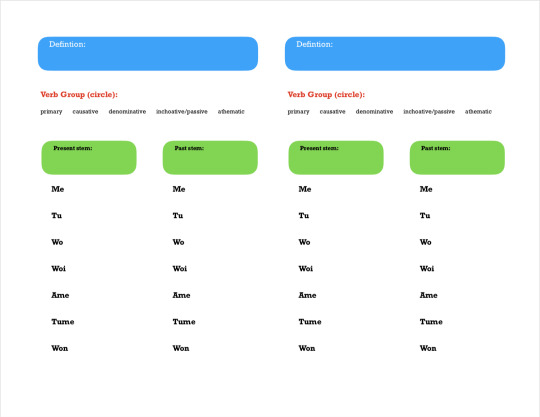
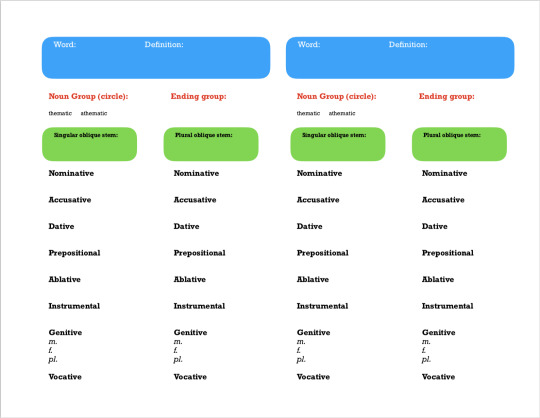
Because Romani verb stems and oblique noun stems are probably one of the hardest things to learn in the language (athematic nouns will be the death of me ;;-;;), I made some practice sheets for verb conjugations and noun declensions. They have two sides, and the idea would be that you would copy all the correct information onto one side, then fold it over and try to recall it all yourself. You can also ignore that and just get two verbs/nouns for the price of one sheet! I also include a double-sided verb/noun version so that you can print out one sheet per day, which is what I’m planning to do. They’re intended to be used with Das-dúma Rromanes by Ronald Lee, which is what the specific terminology refers to; if you’re not using that book, then feel free to ignore anything that you aren’t familiar with.
Both color and black & white versions are available on my drive here, let me know if you have any problems or questions using them and I’ll do my best to help!
#i wanted to make a pretty thing so i tried and failed as usual#please appreciate the color scheme which is made to match the romani flag :')#i honest to god don't think i have any followers learning romani but if any of you are out there i hope this is helpful#and if there are any problems with the link lmk#i'm not sure if sharing links time out so i hope not#resources#romani#romani:general#romani:reference#romani:resources#general:reference#general:resources
5 notes
·
View notes
Link
My Catalan professor showed me this website, which has maps of regional pronunciations and variants of Catalan words collected between 1964 and 1978 by the Institut d’Estudis Catalans. If you want to look at the maps themselves, you should find them by looking under Volums, hovering over a volume, clicking on Mapes, then choosing the word that you want to look at. Just a warning that if you like Catalan sociolinguistics/phonology, you will waste an entire afternoon on this website, so use with caution.
#i think there's a conspiracy to get me to not want to do my work#i could spend hours on this website#like i was listening to corbelles (the song by zoo) and was like hmmm i wonder why they say corbella and not falç#and so i found the map and sure enough in gandia they say corbella#i'm strongly thinking about this as a topic for my ba thesis (even though i still have a couple years to figure that out)#idk what specifically but something in this area because i'm obsessed#catalan#resources#linguistics#la vida sense queue#catalan:general#catalan:resources#catalan:linguistics#catalan:vocab#general:resources#general:linguistics
7 notes
·
View notes
Link
I made a Quizlet set for all the Malayalam lessons so I can actually learn the words this time around! It’s kind of a mess, but (1) what do I ever make that isn’t and (2) just look over the list before you do things that involve typing and you should be okay.
#malayalam#resources#language month#am i the only person on here who uses quizlet??#memrise requires too much commitment#quizlet is way better#malayalam:reference#malayalam:general#malayalam:resources#general:resources
6 notes
·
View notes
Video
youtube
Part Two of Week 4 for the TL90Days challenge! Here’s a video with some tongue twisters in Malayalam, I didn’t understand 90% of it but it was good listening practice and I could actually pick out a few words so yay!
Here’s a website with some tongue twisters as well (including a few from the video I think), they’re written in Latin script so as a non-native speaker I’m not 100% sure how to pronounce them but if you speak Malayalam and want to let me know I’d appreciate it!
#tl90days#i could understand yes no and some numbers i think#but hey at least that's something#it's also just a really cute and wholesome video#i might watch more things on the channel because i found it much easier to understand than a movie or something#but also there are no subtitles so idk how i'm going to learn any new words???#idk i might try it#language month#malayalam#malayalam:general#malayalam:challenge#malayalam:video#malayalam:resources#malayalam:reference#general:challenge#general:video#general:resources
0 notes
Link
(2/2 Random Fun Resources)
This is a resource specifically for Catalan learners, but it’s really cool! It’s basically a website that compiles poetry by Catalan authors and the different songs that these poems have been used in. If you know me and my love of Ovidi and Obrint Pas, or the fact that I have a quote from Estellés as the header image of this blog, you will understand why I think this is amazing and you should too. (My Catalan professor was very angry about the fact that they order people by first name instead of last name, but that’s a minor issue.)
#catalan#resources#i'm a hot mess and posted this to the wrong blog then deleted it without copying the post so i had to write it all over again#please don't mind me#catalan:general#catalan:music#catalan:culture#catalan:resources#general:resources
3 notes
·
View notes
Link
This probably isn’t of much use for learners, but I just stumbled across this website and it’s really interesting. It collects data from online documents for minority languages so that developers can make spell-checkers or other natural language processing systems. Here’s the description from the home page of the website:
Statistical techniques are a key part of most modern natural language processing systems. Unfortunately, such techniques require the existence of large bodies of text, and in the past corpus development has proved to be quite expensive. As a result, substantial corpora exist primarily for languages like English, French, German, etc. where there is a market-driven need for NLP tools.
The idea behind this project is to exploit the vast quantities of text freely available on the web as a way of bringing the benefits of statistical NLP to languages with small numbers of speakers and/or limited computational resources. Initially it was deployed for the six Celtic languages, but over the last ten years I've added support for more than 2000 languages from all parts of the world.
If you care about minority languages, this seems like a project worth supporting!
#it has a ton of languages but it only gives you data not any definitions or anything#just some interesting stuff#minority languages#resources#general:resources
2 notes
·
View notes
Text
Tuvan Resources
I said I would do this in a week about two weeks ago, I’ve been awful and haven’t done it because I was hoping to study some Tuvan but didn’t do a lot. Regardless, here is some stuff, and maybe I will try to add a bit more at some point (I’ve learned better than to promise stuff by now).
First off, here is an article from National Geographic which was my first encounter with the Tuvan language and also just endangered languages as a whole so y’all should read it.
Here are the resources I’ve found so far:
http://sharanur.blogspot.com/?view=magazine - The best resource imo, I’m honestly not sure what language most of the text is in but I’m hoping (and I think it is) mostly in Tuvan, it also has some language lessons through songs which are AMAZING and you can find the first one here
http://mangolanguages.com/available-languages/learn-tuvan/ - Mango language course which, while I am not Mango’s #1 fan (it goes too slowly for me), I do realize is great for a lot of people, so if you have access to it I would check it out
http://tuvan.swarthmore.edu/ - A Tuvan-English dictionary, not sure how comprehensive it is but it’s there if you need it
http://www.endangeredlanguages.com/lang/7309/guide - Lots of videos of people speaking the language, a good practice resource or something to introduce you to the language
https://www.facebook.com/notes/tuvan-throat-singing/tuvan-language-learning-resources/886710948018746/ - Just a list of resources, I covered most of these and the rest are mostly non-active links, but putting it up just in case
If anyone has anything to add, please tell me and I’ll gladly update the post! (This is not limited to the Tuvan language - cultural resources are welcome too.) Sorry that it took so long for me to put it up and that’s it’s not very comprehensive, hope y’all enjoy it!
#tuvan#resources#minority languages#i've been lazy#summer vacation is finally kicking in#also i was really tired when i wrote this so if there's typos pls tell me#general:resources#general:reference
24 notes
·
View notes
Link
Some good Welsh resources breaking down songs line by line! I used them to test my comprehension but they would also be great for beginners trying to learn vocabulary and grammar patterns (although it might be a good idea to use them with something else, like SSiW).
1 note
·
View note
Text
Western Abenaki Resources
These are some resources I’ve been using for Western Abenaki. Since it’s a very endangered language, there’s not a lot of stuff for it online, but I’ve managed to find at least a few things. I’ll try to keep this updated.
http://westernabenaki.com/ - basically the definitive resource for the language, if you want stuff you’ll find it here
I also made a memrise course for the lessons on westernabenaki.com, you can find it here!
http://beginningwesternabenaki.weebly.com/ - VERY helpful website that breaks down a lot of basic stuff and has all the useful vocab (prepositions and other good things) that the lessons from westernabenaki.com are sometimes missing
Morphology of Modern Western Abenaki - some random person’s thesis, but it has a lot of grammar stuff and explains that a bit better than westernabenaki.com. I’m still reading through it, so I don’t really know how much you can glean from it, but so far it seems helpful.
Western Abenaki Page on the Endangered Languages Project website - just some good info, maybe there are some resources hiding here?
Cowasuck Band of the Pennacook Abenaki People - interesting information on the Abenaki people
Western Abenaki Facebook Group - lots of stuff to read and basically as much Abenaki as you’re going to find on the internet as possible
Also look up Joseph Bruchac, he’s a really famous Abenaki storyteller and author and I first discovered the Abenaki people listening to his stories as a little kid. You can find his website here.
#western abenaki masterpost#western abenaki#resources#western abenaki:general#western abenaki:reference#western abenaki:resources#general:resources
72 notes
·
View notes